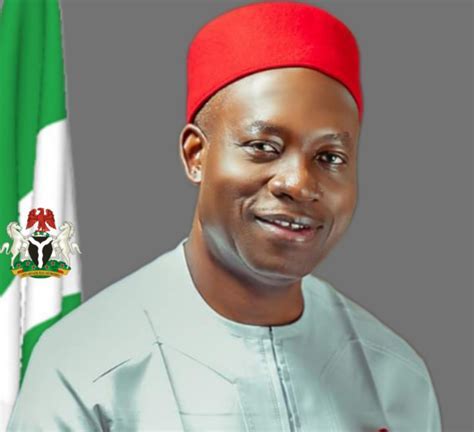Home News
Governor Soludo Bans Public Preaching in Anambra State, Imposes N500,000 Fine
 Onitsha, Anambra State – March 9, 2025
Onitsha, Anambra State – March 9, 2025
In a bold move to curb noise pollution and restore public order, Anambra State Governor, Professor Charles Chukwuma Soludo, has officially banned loud preaching i
... Onitsha, Anambra State – March 9, 2025
Onitsha, Anambra State – March 9, 2025
In a bold move to curb noise pollution and restore public order, Anambra State Governor, Professor Charles Chukwuma Soludo, has officially banned loud preaching in public spaces, including streets and markets across the state. The announcement, made on Saturday, March 8, 2025, comes with a stern warning that violators will face a hefty fine of ?500,000, signaling a crackdown on what the governor described as disruptive practices by roadside preachers.
The decision was spotlighted in a viral video circulating on social media, where Governor Soludo was seen confronting an unidentified preacher at a market, believed to be Ochanja Market in Onitsha. Addressing traders and passersby, the governor emphasized that public spaces are not platforms for unsolicited preaching. “If you want to preach the word of God, go to your church. You cannot come to a marketplace and disturb everyone,” Soludo stated, adding, “You are causing noise pollution here. Those who want to listen will come to you; you cannot force people in the market to hear your message.”
The governor’s stance is part of a broader initiative to regulate noise levels and maintain a conducive environment for business and daily life in Anambra. He noted that the use of loudspeakers in markets has been outlawed due to its adverse effects on residents’ well-being, stating, “We have banned loudspeakers in markets due to noise pollution, which affects people’s eardrums.” Soludo also hinted at a wider clampdown on “fake pastors and prophets,” accusing some of exploiting religion for personal gain while disregarding public welfare.
The enforcement of this policy follows reports of Soludo intercepting a roadside preacher during a transit through Onitsha on Saturday, where he reiterated that such activities are now illegal. “You are violating the law. You cannot take over a public space and turn it into a church,” he warned, underscoring that freedom of worship does not extend to disrupting others.
Reactions to the ban have been mixed. Traders at Ochanja Market expressed relief, with some describing the constant preaching as “noise terrorism” that hampers their business activities. However, religious groups and street preachers have voiced concerns, arguing that the measure infringes on their rights to evangelize. Critics from traditional and religious backgrounds have also accused the governor of bias, though Soludo has maintained that the policy is about public order, not religious suppression.
This latest action aligns with Soludo’s ongoing efforts to sanitize Anambra’s public spaces, including his recent campaigns against insecurity and illicit drug markets. As the state government rolls out enforcement measures, residents are watching closely to see how this ban will reshape the soundscape of Anambra’s bustling streets and markets.
The governor’s administration has yet to release an official statement detailing the implementation process, but the N500,000 fine and potential arrests loom large for those who defy the new order. For now, Anambra’s public spaces are set to become quieter—if the governor’s directive holds firm.
Armed Herdsmen Causing Unrest at Oluyole Federal Constituency, Oyo State
 As of today, March 08, 2025, recent reports indicate that armed herdsmen have caused significant unrest in the Oluyole Federal Constituency of Oyo State, Nigeria, threatening the safety and livelihoo
As of today, March 08, 2025, recent reports indicate that armed herdsmen have caused significant unrest in the Oluyole Federal Constituency of Oyo State, Nigeria, threatening the safety and livelihoo
 As of today, March 08, 2025, recent reports indicate that armed herdsmen have caused significant unrest in the Oluyole Federal Constituency of Oyo State, Nigeria, threatening the safety and livelihoods of local residents. Tolulope Akande-Sadipe, a member of the House of Representatives representing the constituency, has publicly raised the alarm about the escalating situation, particularly in communities such as Ogunmakin and the Gambari Reserve area.
As of today, March 08, 2025, recent reports indicate that armed herdsmen have caused significant unrest in the Oluyole Federal Constituency of Oyo State, Nigeria, threatening the safety and livelihoods of local residents. Tolulope Akande-Sadipe, a member of the House of Representatives representing the constituency, has publicly raised the alarm about the escalating situation, particularly in communities such as Ogunmakin and the Gambari Reserve area.
President Bola Tinubu Appoints Professor Attahiru Jega as Presidential Adviser and Coordinator of Presidential Livestock Reforms
 Abuja, Nigeria – March 8, 2025 – In a significant move to address Nigeria’s longstanding challenges in the livestock sector, President Bola Ahmed Tinubu has appointed Professor Attahiru Muhammadu Jega
Abuja, Nigeria – March 8, 2025 – In a significant move to address Nigeria’s longstanding challenges in the livestock sector, President Bola Ahmed Tinubu has appointed Professor Attahiru Muhammadu Jega Abuja, Nigeria – March 8, 2025 – In a significant move to address Nigeria’s longstanding challenges in the livestock sector, President Bola Ahmed Tinubu has appointed Professor Attahiru Muhammadu Jega as the Presidential Adviser and Coordinator of Presidential Livestock Reforms. The announcement, made late Friday, March 7, 2025, by Bayo Onanuga, the Special Adviser to the President on Information and Strategy, underscores the administration’s commitment to modernizing Nigeria’s agricultural framework and resolving the persistent farmer-herder conflicts that have plagued the nation for decades.
Abuja, Nigeria – March 8, 2025 – In a significant move to address Nigeria’s longstanding challenges in the livestock sector, President Bola Ahmed Tinubu has appointed Professor Attahiru Muhammadu Jega as the Presidential Adviser and Coordinator of Presidential Livestock Reforms. The announcement, made late Friday, March 7, 2025, by Bayo Onanuga, the Special Adviser to the President on Information and Strategy, underscores the administration’s commitment to modernizing Nigeria’s agricultural framework and resolving the persistent farmer-herder conflicts that have plagued the nation for decades.-
Conflict Resolution: Reducing the decades-long clashes between farmers and herders, which have claimed thousands of lives and displaced communities, particularly in the Middle Belt and northern regions.
-
Infrastructure Development: Enhancing facilities for ranching, veterinary services, and cross-breeding to improve livestock yields.
-
Economic Growth: Positioning the livestock sector as a viable contributor to Nigeria’s GDP, attracting foreign investment, and creating jobs.
-
Sustainability: Promoting environmentally friendly practices to address overgrazing and land degradation.
Nigeria Plunged into Darkness Again as National Grid Loses Over 2,000 Megawatts Amid Federal Condemnation of Air Force Attack on Ikeja Electric
 Lagos, Nigeria – March 8, 2025 – Many parts of Nigeria were thrust into darkness once again on Friday, March 7, 2025, as the national power grid suffered a significant collapse, losing over 2,000 mega
Lagos, Nigeria – March 8, 2025 – Many parts of Nigeria were thrust into darkness once again on Friday, March 7, 2025, as the national power grid suffered a significant collapse, losing over 2,000 mega
 Lagos, Nigeria – March 8, 2025 – Many parts of Nigeria were thrust into darkness once again on Friday, March 7, 2025, as the national power grid suffered a significant collapse, losing over 2,000 megawatts of electricity. This marks the second major power supply disturbance of the year, exacerbating the country’s chronic energy woes. The grid failure coincided with a stern condemnation from the federal government regarding a violent incident the previous day, where personnel from the Nigerian Air Force attacked the headquarters and facilities of the Ikeja Electric Distribution Company (IKEDC) in Lagos, leaving several people injured and critical equipment vandalized.
Lagos, Nigeria – March 8, 2025 – Many parts of Nigeria were thrust into darkness once again on Friday, March 7, 2025, as the national power grid suffered a significant collapse, losing over 2,000 megawatts of electricity. This marks the second major power supply disturbance of the year, exacerbating the country’s chronic energy woes. The grid failure coincided with a stern condemnation from the federal government regarding a violent incident the previous day, where personnel from the Nigerian Air Force attacked the headquarters and facilities of the Ikeja Electric Distribution Company (IKEDC) in Lagos, leaving several people injured and critical equipment vandalized.

